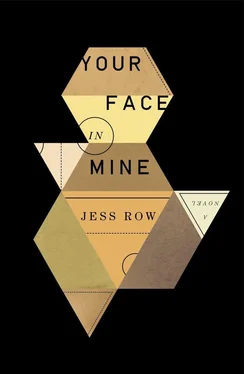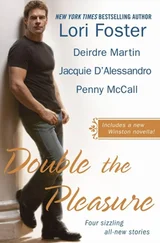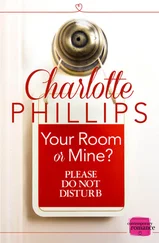Listen to him, she says. You’d think he actually knows what he’s talking about.
He doesn’t play himself?
No, of course he does, he’s just not, like, an expert , exactly. I played tennis at Penn. I guess I’m a little sensitive.
You’ll take over when the time comes, I guess.
No, she says, pouring herself another half-glass, no, it’s best not to learn that kind of thing from Mom. I don’t want to make it an issue in our relationship. No stage parenting here.
Spoken like a child psychologist.
Yeah, well, it’s got to be good for something, doesn’t it? Are you done with the zucchini yet? She looks over my shoulder, at the counter, and smiles. Martin, she calls out, who is this guy? What, did you decide I need a sous-chef?
I disclaim any knowledge, Martin calls back. We don’t talk about food.
Oh, yeah, right. Only the serious man stuff. Money. Power. Race. The big three. I forgot.
I had a good teacher, I say, but a limited repertoire. Half the things I know how to make I can’t, because you can’t get the ingredients here. Or if you can, it never tastes right. Wendy used to say that cooking an American duck was like cooking a big bag of fat with a little meat at the bottom.
Robin pours the zucchini chunks into a bowl, adds olive oil, balsamic vinegar, a splash of the wine, and mixes everything together with her fingers. I hope you don’t mind, she says. I like to get my hands dirty. I have to say, Kelly, you sound extremely well adjusted.
I’m not sure that’s such a compliment.
No, it’s an observation. We get to make those in my line of work. Notice I said sound . And the other observation I was going to make was: it’s a lot of change for you, I mean, this tremendous loss, leaving one job and one city, moving home, taking up another job, then leaving your entire line of work.
Baltimore isn’t really home. My parents aren’t here. And we were never from here; we landed here for a while and then left. I’m not terribly attached to it, honestly. All I really need is a place to keep things.
That sounds very portable and comme il faut .
Well, I say, I guess that’s right, for the time being.
Robin, Martin says, I’m going to make you send him a bill.
We’re just talking.
Anyway, he’s supposed to be asking the questions.
I don’t think that’s what this is going to turn out to be, she says. I think this is going to be like one of those Janet Malcolm pieces where the reporter becomes a character in the story. Like In the Freud Archives . I’m just teasing, she says. And trying to show off. Another bad habit.
Not at all, I say. In public radio that’s just casual conversation. You’d fit right in.
Well, I’m a listener, she says. Martin’s not. You can always tell a Jack and Jill girl from a mile away.
You were in Jack and Jill?
Oh, good, she says, that’s one thing I don’t have to explain to you about the black middle class. How do you know about Jack and Jill?
My best friend’s girlfriend was in Jack and Jill. When I was in college. Amherst. She had some kind of scholarship from them, too.
And she talked to you about it?
Not really. She just said it was sort of what held her world together. Like a country club, a sorority, the Girl Scouts, all wrapped up in one package. What, it’s not supposed to be a secret, is it?
No. I think we mostly assume that no one else really gives a damn. Anyway, it’s very old school, very aristocratic. There’s color prejudice, too, within the black community. Of course. I don’t mean to be giving you a lecture. But J and J — one of my friends used to call it Just Jamocha. Or JSOP. Just Short of Passing.
She stands up straight and does a quick shoulder rotation, as if to punctuate the thought, and I duly notice that her skin is easily three shades lighter than Martin’s. In an amateurish way, I would call her medium-light and Martin just absolutely medium, perfectly what one would expect, halfway between, say, Shaquille O’Neal and Harry Belafonte. Robin, on the other hand, has definite pink and lavender undertones; maybe it’s makeup, but I doubt it. You could even say that her face shows a certain grayness, a kind of pallor, that some light-skinned black women have. As a factual statement. I’m aware, at the same moment, that I would never describe her as anything other than beautiful.
Listen, I say, I don’t want to make you uncomfortable. We don’t have to be this, this — right off the bat — this—
Anthropological?
Right.
Well, why not? Isn’t it true, as the cliché goes, you know, that the color line is all about ignorance? Martin told me your wife was from China, right? Tell me if it’s okay to discuss this.
It’s fine.
Well, then, I would wager, I would guess, that you know much more about the intricacies of Chinese culture than you do about African American culture. Though one has been under your nose, so to speak, your entire life, and the other one you had to seek out, actively choose .
I think that’s probably true, I say. On the level of conscious intelligence, factual information, yes, definitely. But then again, if you look at it from my point of view, it’s easier to be an expert on China, isn’t it? No one expects me to be an expert on black people. Frankly, nobody wants me to be an expert on black people. That would be intrusive. That would be weird. It would raise all kinds of red flags.
But I’m not talking about being an expert. I’m talking about basic cultural competence.
Give me an example, then.
Oh, no. She has a high, piping laugh, a practiced laugh, I think, from working with children all day long, full of soft exclamation points. I’m not giving you a test. Anyway, we’ve got to feed those girls before they collapse. Come on. You can help me set the table.
—
Look, Sherry says to Tamika, when dinner is almost finished. She points at my hand. He has a wedding ring, too. See? I told you that all grown-ups wear wedding rings. They have to. It’s, like, a law . When you’re a grown-up you have to get married.
Who told you that? Robin asks her, her hands paused above her plate. Someone in school?
No one. I just figured it out myself.
It’s not true, you know, Martin says. Sherry. Look at me when I’m talking to you. Grown-ups don’t have to be married.
Well, you’re married, aren’t you? Sherry says, looking up at me. Mr. Kelly? You’re married, right?
Not exactly.
That’s the end of this conversation, Robin says. Sherry, you have to learn that there are some questions—
No, I say, it’s all right. If it’s all right with you.
Go ahead, Martin says. We don’t keep secrets in this house.
Well, Sherry, I say, I was married, but my wife died. You know what that means, right?
Did she have leukemia?
She died in a car accident.
Sherry scrunches up her nose and squints at me, as if to ascertain, through some secret method, whether this is the truth or another moralistic fable.
Was she wearing her seat belt?
She was.
Then she shouldn’t have died, right?
It doesn’t always work that way.
Okay, Martin says. Okay—
I hold up a hand. Let her talk, I say. Let her ask what she wants to ask. Sherry, is there anything more you’d like to know?
Tamika, sitting perfectly straight, removing bits of meat from her skewer with great delicacy, looks over at wayward Sherry and all but rolls her eyes. That’s enough, Shay-Shay, she says. You don’t have to ask him about his little girl.
What little girl? Robin asks. Tamika! She reaches over and pulls Tamika’s chin toward her. What are you talking about?
Читать дальше












